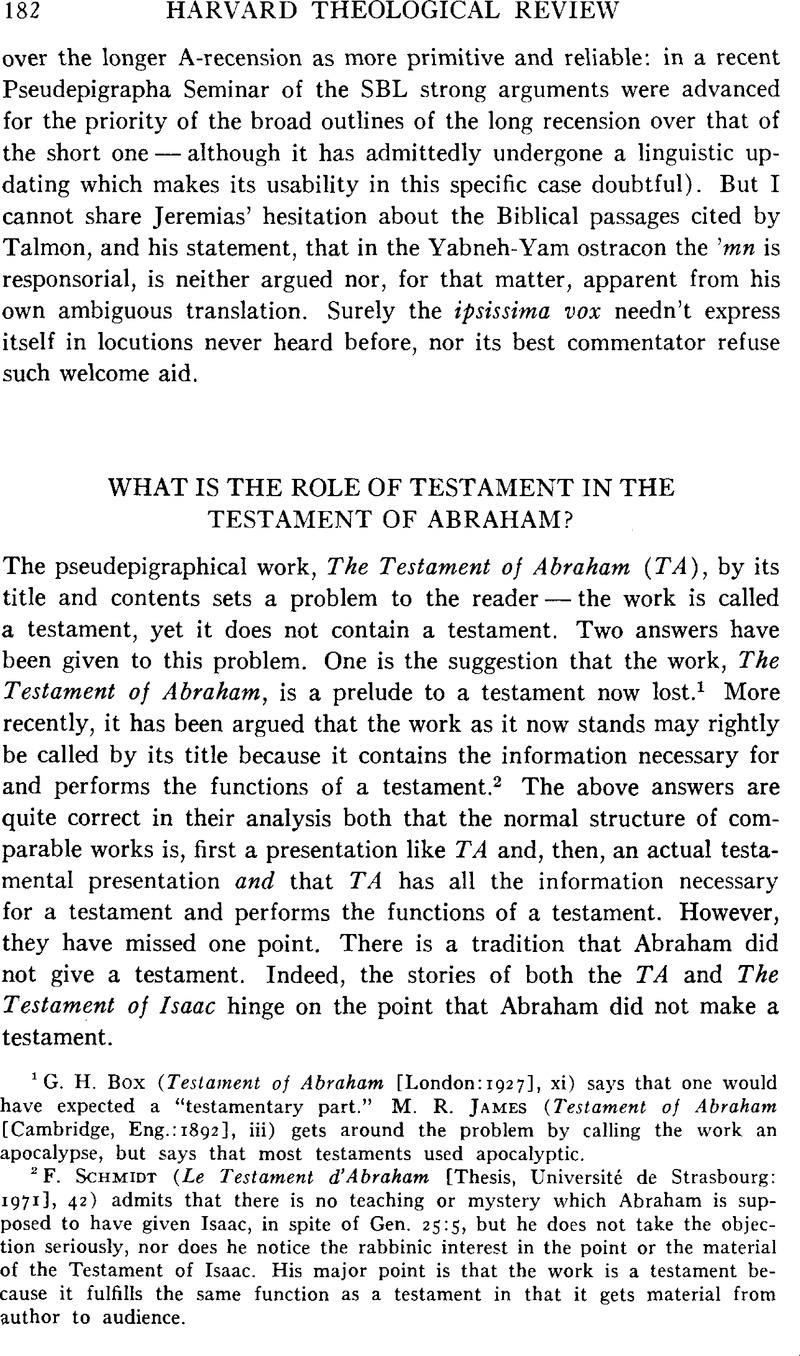No CrossRef data available.
Article contents
What Is the Role of Testament in the Testament of Abraham?
Published online by Cambridge University Press: 10 June 2011
Abstract

- Type
- Notes and Observations
- Information
- Copyright
- Copyright © President and Fellows of Harvard College 1974
References
1 Box, G. H. (Testament of Abraham [London:1927], xi)Google Scholar says that one would have expected a “testamentary part.” James, M. R. (Testament of Abraham [Cambridge, Eng.:1892], iii)Google Scholar gets around the problem by calling the work an apocalypse, but says that most testaments used apocalyptic.
2 Schmidt, F. (Le Testament d'Abraham [Thesis, Université de Strasbourg: 1971], 42)Google Scholar admits that there is no teaching or mystery which Abraham is supposed to have given Isaac, in spite of Gen. 25:5, but he does not take the objection seriously, nor does he notice the rabbinic interest in the point or the material of the Testament of Isaac. His major point is that the work is a testament because it fulfills the same function as a testament in that it gets material from author to audience.
3 Jubilees shows a different tradition, where Abraham before his death gives Isaac commands and teaching about forms of worship as well as blessing (21). This tradition is reflected in T.L. 9:12.
4 Ginzberg, L. (The Legends of the Jews [Philadelphia: 1925], V, 265)Google Scholar also cites later material from rabbinic sources to this point.
5 This work, together with The Testament of Jacob, circulated with The Testament of Abraham (further cause for its title “Testament”). Citations for Testament of Isaac are pages in Box, op. cit.
6 Do these works reflect a situation where it was necessary to make a will or that those who were not married and thus could not have sons and give them their inheritance as the monks (to whom at least the final versions of the testaments would seem to be addressed) were not and therefore could not — that those sought the special blessing of the patriarchs “that through their supplication may it be to us to obtain their part and their inheritance” (Box translation, 88).
7 Schmidt (op. cit., 42) also notes the emphasis on making depositions, but does not make any point from this. See above, note 2.
8 A paper, The Genre Testament and its Use for Forecasting the Future in Hellenistic Judaism, was presented on this topic by the author at the SBL meeting, 1972.
9 The work The Apocalypse of Abraham is based on this understanding. Abraham is also noted as receiving visions among the offerings (IV Ez. 3:15) and in general for knowing the future.
10 The use of The Testament of Abraham as a vehicle for two different opinions (the long and the short version) shows the usage of the vehicle “testament” for such purposes. The figure of Abraham may also be selected because of Abraham's known concern for men (cf. Kolenkow, A., The Ascription of Romans 4:5, HTR 60 [1967], 228–30)CrossRefGoogle Scholar, a point stressed as the interest of God in the long version. The long version seems to desire to speak to a situation of sudden death and destruction where the question is, does God will such destruction and does such destruction lead to the eternal destruction of those caught in their sins by the holocaust.




